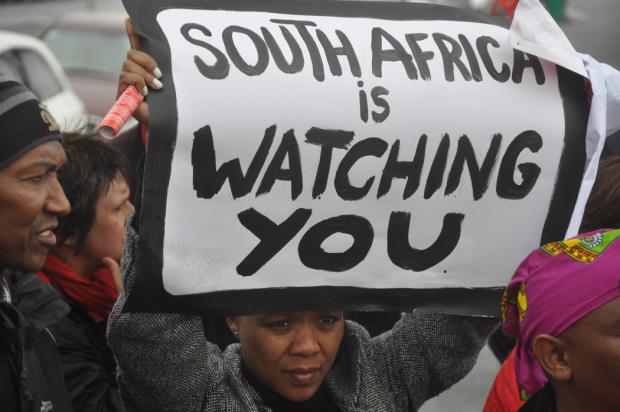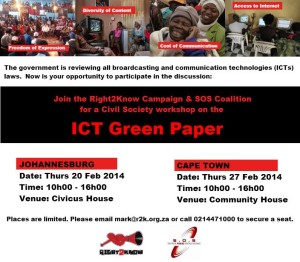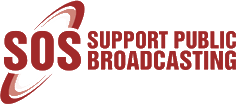SOS Astonished by Claim that Varsity-Qualified Employees are “a Drain to the SABC”
February 10, 2014
Letter to Minister: Progress Report on Commitments Made in 2013
February 13, 2014ICT Policy Review Green Paper Workshops
The government is reviewing laws on freedom of expression, diversity in radio & TV, the cost of communication & internet access. Now is your opportunity to participate in the discussion about the future of communication in South Africa.
The Right2Know Campaign and SOS Coalition are running two workshops to develop a civil society response to the Department of Communicationssee executive summary hereormation and Communication Technology (ICT) Green Paper”> Information and Communication Technology (ICT) Green Paper. Please join us in either Johannesburg (Thursday 20 Feb) or Cape Town (Thursday 27 Feb). Kindly RSVP.
What is at stake?
After almost 20 years of democracy much of South African society retains the structure of our Apartheid past. While a small elite have access to a wide range of TV and radio on the paid platforms like DSTV, the majority only have access to an underfunded SABC and Community radio/TV that cannot adequately serve the information and expression needs of a country as diverse and complex as South Africa.
Similarly, those that live in wealthy urban areas enjoy high speed internet and quality telephone networks. The majority of people living in South Africa rely on the cellphone network and bear the brunt of cellphone companies profiteering. The democratising potential of the internet – the ability to draw on vast amounts of knowledge and to produce and upload content – will remain elusive for most people until high-speed broadband networks are set up connecting every community.
Then there is the return of the censor, the securocrat, and the spy. Evidence that there is political interference in editorial at the SABC and community radios is mounting. The governance of stations is too often captured by elites. Edward Snowden’s courageous exposure of the USA’s extensive online spying programmes shows us just how susceptible we are to state surveillance on the internet.
Indeed the current communication system reproduces South Africa’s great inequity. This is reflected in the policy debate itself where these issues are too often discussed in very technical terms and the debate is dominated by ‘experts’ advancing the interests of big business and/or the government. It is critical that ordinary people have a voice.
Here are some of the questions we hope to answer together in the ICT policy process:
1. Who controls the air waves – and to what end? Who should have limited radio and TV licences? How should the SABC and community radio/TV be structured to ensure its political independence and public accountability? How should we fund and produce quality content? How can ICASA’s regulation be strengthened? How should we promote diverse views, languages, and cultures?
2. Who should benefit from the internet and telephones? What is a fair price to pay for telephone and internet services? Should these services – or at least basic access – be available free of charge? How should prices be set? How can we ensure everyone gains access to high speed broadband? What is the role of the state, private sector, and communities in providing telecommunications infrastructure and services?
3. How do we stop the spies? How can we ensure our privacy when using the internet and our telephones? Is all internet traffic treated equally and free of surveillance? If not, what can be done so that the people control their own information and not the state or private telecoms? How do we prevent cyber crime?
The ICT Green Paper follows a Framing Paper that addresses critical principles that should underpin communications policy. You can read the Right2Know and SOS Coalition responses to the Framing Paper.
If you require more background to the various issues see R2K’s work on media freedom/diversity and on access to telecommunication, or visit the SOS website.
For more background and guiding principles read the Right2Know Position Paper on Media Freedom, Diversity, and Right to Communicate and the SOS’s Vision for Public Broadcasting for background on public broadcasting in South Africa.

